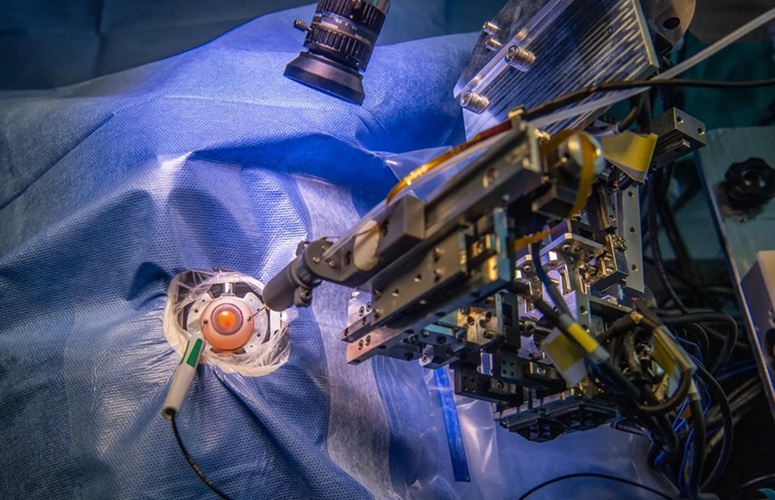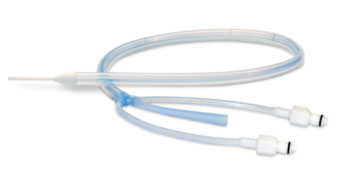Esophageal Insert Modulates Patient Temperature 
|
By HospiMedica International staff writers Posted on 22 Jun 2015 |
A novel technology platform helps to control a patients’ temperature during clinical procedures, using the esophageal environment as a conduit.
The esophageal cooling device (ECD) is a single use, fully-enclosed triple lumen system that is inserted into the esophagus. Two of the lumens attach to standard existing temperature modulation equipment, while a third lumen simultaneously allows gastric decompression and drainage. The device can be rapidly inserted, in a fashion similar to a standard orogastric tube, and can be used to control patient temperature in the operating room (OR), recovery room, emergency room, or intensive care unit (ICU).
The device can be used for whole-body temperature modulation, cooling or warming a patient as deemed necessary. It can be used to warm patients in the OR to help prevent infection, wound complications, excessive blood loss, and prolonged recovery time. In the ICU or emergency wards, on the other hand, the device can effectively cool patients suffering from heat stroke. The ECD is a product of Advanced Cooling Therapy (Chicago, IL, USA), and has been approved in Europe, Canada, and Australia.
“We've been getting phenomenal feedback from clinicians using our device for both cooling and warming,” said Erik Kulstad, MD, MSc, president and co-founder of ACT. “Cooling patients is important for a number of clinical conditions in the emergency room and intensive care unit, but warming patients is equally important in the operating room, particularly during long surgeries.”
Guidelines developed under the Surgical Care Improvement Project (SCIP) of the Joint Commission (Oakbrook Terrace, IL, USA) specifically focuses on maintaining optimal temperature in patients during surgery. In addition, preventing inadvertent perioperative hypothermia is recommended by major organizations, including the Centers for Medicare and Medicaid Services and the American Society of Anesthesiologists (ASAHQ; Schaumburg, IL, USA).
Related Links:
Advanced Cooling Therapy
Joint Commission
American Society of Anesthesiologists
The esophageal cooling device (ECD) is a single use, fully-enclosed triple lumen system that is inserted into the esophagus. Two of the lumens attach to standard existing temperature modulation equipment, while a third lumen simultaneously allows gastric decompression and drainage. The device can be rapidly inserted, in a fashion similar to a standard orogastric tube, and can be used to control patient temperature in the operating room (OR), recovery room, emergency room, or intensive care unit (ICU).
The device can be used for whole-body temperature modulation, cooling or warming a patient as deemed necessary. It can be used to warm patients in the OR to help prevent infection, wound complications, excessive blood loss, and prolonged recovery time. In the ICU or emergency wards, on the other hand, the device can effectively cool patients suffering from heat stroke. The ECD is a product of Advanced Cooling Therapy (Chicago, IL, USA), and has been approved in Europe, Canada, and Australia.
“We've been getting phenomenal feedback from clinicians using our device for both cooling and warming,” said Erik Kulstad, MD, MSc, president and co-founder of ACT. “Cooling patients is important for a number of clinical conditions in the emergency room and intensive care unit, but warming patients is equally important in the operating room, particularly during long surgeries.”
Guidelines developed under the Surgical Care Improvement Project (SCIP) of the Joint Commission (Oakbrook Terrace, IL, USA) specifically focuses on maintaining optimal temperature in patients during surgery. In addition, preventing inadvertent perioperative hypothermia is recommended by major organizations, including the Centers for Medicare and Medicaid Services and the American Society of Anesthesiologists (ASAHQ; Schaumburg, IL, USA).
Related Links:
Advanced Cooling Therapy
Joint Commission
American Society of Anesthesiologists
Read the full article by registering today, it's FREE! 

Register now for FREE to HospiMedica.com and get access to news and events that shape the world of Hospital Medicine. 
- Free digital version edition of HospiMedica International sent by email on regular basis
- Free print version of HospiMedica International magazine (available only outside USA and Canada).
- Free and unlimited access to back issues of HospiMedica International in digital format
- Free HospiMedica International Newsletter sent every week containing the latest news
- Free breaking news sent via email
- Free access to Events Calendar
- Free access to LinkXpress new product services
- REGISTRATION IS FREE AND EASY!
Sign in: Registered website members
Sign in: Registered magazine subscribers
Latest Critical Care News
- 'Universal' Kidney to Match Any Blood Type
- Light-Based Technology to Measure Brain Blood Flow Could Diagnose Stroke and TBI
- AI Heart Attack Risk Assessment Tool Outperforms Existing Methods
- Smartphone Imaging System Enables Early Oral Cancer Detection
- Swallowable Pill-Sized Bioprinter Treats GI Tract Injuries

- Personalized Brain “Pacemakers” Could Help Patients with Hard-To-Treat Epilepsy
- Microscopic DNA Flower Robots to Enable Precision Medicine Delivery
- Origami Robots to Deliver Medicine Less Invasively and More Effectively
- Improved Cough-Detection Technology Aids Health Monitoring
- AI Identifies Children in ER Likely to Develop Sepsis Within 48 Hours
- New Radiofrequency Therapy Slows Glioblastoma Growth
- Battery-Free Wireless Multi-Sensing Platform Revolutionizes Pressure Injury Detection
- Multimodal AI to Revolutionize Cardiovascular Disease Diagnosis and Treatment
- AI System Reveals Hidden Diagnostic Patterns in Electronic Health Records
- Highly Sensitive On-Skin Sensing Monitor Detects Vitamin B6 and Glucose in Sweat
- Artificial Intelligence Revolutionizing Pediatric Anesthesia Management
Channels
Surgical Techniques
view channel
Robotic Assistant Delivers Ultra-Precision Injections with Rapid Setup Times
Age-related macular degeneration (AMD) is a leading cause of blindness worldwide, affecting nearly 200 million people, a figure expected to rise to 280 million by 2040. Current treatment involves doctors... Read more
Minimally Invasive Endoscopic Surgery Improves Severe Stroke Outcomes
Intracerebral hemorrhage, a type of stroke caused by bleeding deep within the brain, remains one of the most challenging neurological emergencies to treat. Accounting for about 15% of all strokes, it carries... Read morePatient Care
view channel
Revolutionary Automatic IV-Line Flushing Device to Enhance Infusion Care
More than 80% of in-hospital patients receive intravenous (IV) therapy. Every dose of IV medicine delivered in a small volume (<250 mL) infusion bag should be followed by subsequent flushing to ensure... Read more
VR Training Tool Combats Contamination of Portable Medical Equipment
Healthcare-associated infections (HAIs) impact one in every 31 patients, cause nearly 100,000 deaths each year, and cost USD 28.4 billion in direct medical expenses. Notably, up to 75% of these infections... Read more
Portable Biosensor Platform to Reduce Hospital-Acquired Infections
Approximately 4 million patients in the European Union acquire healthcare-associated infections (HAIs) or nosocomial infections each year, with around 37,000 deaths directly resulting from these infections,... Read moreFirst-Of-Its-Kind Portable Germicidal Light Technology Disinfects High-Touch Clinical Surfaces in Seconds
Reducing healthcare-acquired infections (HAIs) remains a pressing issue within global healthcare systems. In the United States alone, 1.7 million patients contract HAIs annually, leading to approximately... Read moreHealth IT
view channel
Printable Molecule-Selective Nanoparticles Enable Mass Production of Wearable Biosensors
The future of medicine is likely to focus on the personalization of healthcare—understanding exactly what an individual requires and delivering the appropriate combination of nutrients, metabolites, and... Read moreBusiness
view channel
Philips and Masimo Partner to Advance Patient Monitoring Measurement Technologies
Royal Philips (Amsterdam, Netherlands) and Masimo (Irvine, California, USA) have renewed their multi-year strategic collaboration, combining Philips’ expertise in patient monitoring with Masimo’s noninvasive... Read more
B. Braun Acquires Digital Microsurgery Company True Digital Surgery
The high-end microsurgery market in neurosurgery, spine, and ENT is undergoing a significant transformation. Traditional analog microscopes are giving way to digital exoscopes, which provide improved visualization,... Read more
CMEF 2025 to Promote Holistic and High-Quality Development of Medical and Health Industry
The 92nd China International Medical Equipment Fair (CMEF 2025) Autumn Exhibition is scheduled to be held from September 26 to 29 at the China Import and Export Fair Complex (Canton Fair Complex) in Guangzhou.... Read more
















